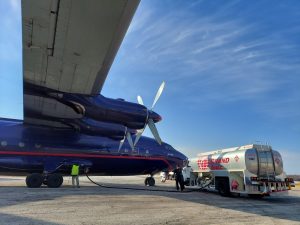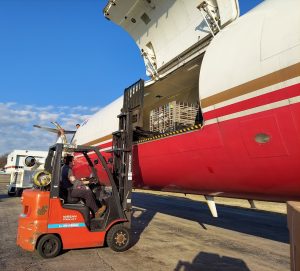Air Freight Challenges
No matter which mode of transportation you use to ship your cargo, each has its hurdles. Sea freight, for example, may experience inclement weather or seasonal capacity limitations. Road freight faces the uncertainty of road construction or unexpected traffic jams.
Air freight is no exception. While shipping goods by air is the fastest way to deliver cargo to its destination, challenges do exist.
Surging Fuel Prices
 The constant fluctuating cost of fuel is an on-going issue for the air freight industry. Recent military conflicts abroad have caused crude oil prices to spike to an all-time high. To offset this increase in cost, many airlines have implemented fuel surcharges. This, in turn, is pushing air freight rates higher and higher.
The constant fluctuating cost of fuel is an on-going issue for the air freight industry. Recent military conflicts abroad have caused crude oil prices to spike to an all-time high. To offset this increase in cost, many airlines have implemented fuel surcharges. This, in turn, is pushing air freight rates higher and higher.
Trade Protectionism
Government policies that restrict imports from other countries, or protectionism, is of great concern for the air freight industry. Continued or increased tariffs and import quotas may lead to a significant decline in air freight volume. It could also have a negative impact on the air freight industry by causing a major shift to locally produced goods that can be transported by truck rather than by plane.
Airline Security
Escalating security concerns have caused another challenge for air freight in the form of longer, more stringent cargo inspections. Unfortunately, today’s atmosphere of air transportation is clouded by the all too real prospect of terrorist activity such as illegal shipments of hazardous materials being placed aboard aircraft.
Rightfully so, security has been tightened and cargo regulations have intensified. This equates to higher screening costs and longer inspection times, thus slowing the speed at which air freight can travel.
Air Freight Capacity Constraints
 The most prevalent air freight challenge is capacity limitations. As the immediate need for both consumer and industrial goods continues to grow, so does the demand for air freight transportation. Availability of cargo planes, however, is tight. And the addition of new aircraft into the market is exceedingly slow.
The most prevalent air freight challenge is capacity limitations. As the immediate need for both consumer and industrial goods continues to grow, so does the demand for air freight transportation. Availability of cargo planes, however, is tight. And the addition of new aircraft into the market is exceedingly slow.
Commercial flights account for a considerable amount of air freight capacity due to their ability to carry cargo in the belly of the plane. This option isn’t always feasible, though, due to constraints such as minimum door measurements needed for cargo pallets and larger boxes.
During the pandemic, additional freight space became available in the main body of commercial planes as passenger travel dropped dramatically. Many airlines even converted some of their passenger aircraft to freighter planes to help recoup lost revenue.
Now that people are returning to flying, main body freight space is almost non-existent. Bellyhold space is diminishing as passenger luggage once again shares that chamber. And many converted passenger planes are returning to their original status, thus cutting down the number of existing freighter planes once again.
Managing Air Freight Challenges
The best way to manage the various air freight challenges, is by utilizing an experienced, reputable logistics company. Grand Aire has been operating as a leading air service provider for over 35 years. We understand these hurdles and have the expertise to navigate through them, providing you with the most favorable air transportation options available.
Our Logistics Specialists are accessible 24/7/365 to assist with your air shipping needs. Simply contact us at 1-800-74-GRAND or email our team at logistics@grandaire.com.
